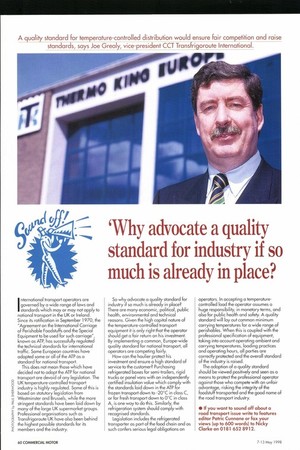'Why advocate a quality standard for industry if so much
Page 60

If you've noticed an error in this article please click here to report it so we can fix it.
is already in place? A quality standard for temperature-controlled distribution would ensure fair competition and raise standards, says Joe Grealy, vice-president CCT Transfrigoroute International.
International transport operators are governed by a wide range of laws and standards which may or may not apply to national transport in the UK or Ireland. Since its ratification in September 1970, the "Agreement on the International Carriage of Perishable Foodstuffs and the Special Equipment to be used for such carriage", known as ATP, has successfully regulated the technical standards for international traffic. Some European countries have adopted some or all of the ATP as a standard for national transport. This does not mean those which have decided not to adopt the ATP for national transport are devoid of any legislation. The UK temperature-controlled transport industry is highly regulated. Some of this is based on statutory legislation from Westminster and Brussels, while the more stringent standards have been laid down by many of the large UK supermarket groups. Professional organisations such as Transfrigoroute UK have also been behind the highest possible standards for its members and the industry. So why advocate a quality standard for industry if so much is already in place? There are many economic, political, public health, environmental and technical reasons. Given the high capital nature of the temperature-controlled transport equipment it is only right that the operator should get a fair return on his investment. By implementing a common, Europe-wide quality standard for national transport, all operators are competing fairly. How can the haulier protect his investment and ensure a high standard of service to the customer? Purchasing refrigerated boxes for semi-trailers, rigid trucks or panel vans with an independently certified insulation value which comply with the standards laid down in the ATP for frozen transport down to -20°C in class C, or for fresh transport down to 0°C in class A, is one way to do this. Similarly, the refrigeration system should comply with recognised standards. Legislation includes the refrigerated transporter as part of the food chain and as such confers serious legal obligations on operators. In accepting a temperaturecontrolled load the operator assumes a huge responsibility, in monetary terms, and also for public health and safety. A quality standard will lay out common minimum carrying temperatures for a wide range of perishables. When this is coupled with the professional specification of equipment, taking into account operating ambient and carrying temperatures, loading practices and operating hours, all parties are correctly protected and the overall standard of the industry is raised. The adoption of a quality standard should be viewed positively and seen as a means to protect the professional operator against those who compete with an unfair advantage, risking the integrity of the foodstuff transported and the good name of the road transport industry.
























































































































